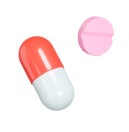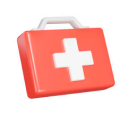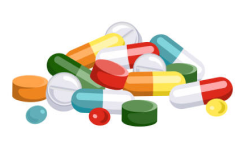For more information
What else should I know about Postnatal Medications and Nutrition?
This leaflet describes some of the medications that may be prescribed by your doctor after your delivery.
Paracetamol | |
| What is this for | This is a painkiller which can help reduce mild pain or fever. |
| How to take | Take when necessary. It may be taken with or without food. |
| Side effects | Generally well tolerated without any significant side effects. |
| Other considerations | Do not take with any other paracetamol-containing products e.g. Panadol, Anarex |
| Mefenamic Acid / Naproxen / Ibuprofen (Non-Steroidal Anti-Inflammatory Drugs or NSAIDs) | |
| What is this for | These are painkillers which can help to reduce moderate to severe pain, or when your pain is not relieved by paracetamol. |
| How to take | Take when necessary or as directed by your doctor. Take after food. |
| Side effects | Stomach discomfort or gastric irritation is a common side effect. Taking this medication after food reduces this side effect. You may also be given some medications such as antacids that will help protect the stomach from gastric irritation. |
| Other considerations | |
| Stomach Protectants e.g. antacids / famotidine | |
| What is this for | Antacids or famotidine may be prescribed by your doctor as a stomach protectant when you are given NSAIDs, to help with stomach discomfort. |
| How to take | As antacids may come in tablet or liquid form, always follow the instructions provided. Most antacids are usually chewable tablets and you should chew them before taking the NSAIDs. Famotidine is usually given once or twice daily, and can be taken together with NSAIDs. |
| Side effects | Generally well tolerated without any significant side effects. |
| Other considerations | You may need to space antacids at least 2 hours apart from some medications. Please check with your healthcare professional if you are taking some other medications. |
| Multivitamins and Iron supplements | |
| What is this for | Iron is needed to make red blood cells. Multivitamins containing iron or plain iron supplements may be given after a delivery, to help replenish the blood loss during delivery. |
| How to take | Follow the instructions on the medication label. |
| Side effects | Generally well tolerated. Some of the common side effects are:
|
| Other considerations | For supplements containing iron, space at least 2 hours apart from coffee, tea, milk, dairy products, and calcium-containing supplements for better iron absorption. (Exception: Iron polymaltose e.g. Maltofer / Floron). |
Laxatives e.g. liquid paraffin / lactulose | |
| What is this for | You may be prescribed laxatives, either a lubricant (e.g. liquid paraffin) or a stool softener (e.g. lactulose) for short-term treatment of constipation. |
| How to take | It may be taken with or without food. |
| Side effects | Generally well tolerated. May cause diarrhea, upset stomach |
| Other considerations | If you are prescribed liquid paraffin: Do not lie down for at least 30 minutes after taking this medicine to avoid aspiration pneumonia (medicine leaking back into the lungs). Avoid taking liquid paraffin with multivitamins as it may interfere with the absorption of the fat-soluble vitamins in multivitamins. Space at least 1 hour apart between these two medications |
Galactogogues e.g. domperidone / fenugreek | |
| What is this for | You may be prescribed galactogogues, which are medications to stimulate breast milk production. |
| How to take | If you are prescribed domperidone, take half to one hour before food. If you are prescribed fenugreek, it may be taken with or without food |
| Side effects | Generally well tolerated. |
What are some rare but serious side-effects that I need to seek medical advice immediately?
- Swollen face/eyes/lips/tongue
- Difficulty in breathing
- Skin rashes
Why is good nutrition after delivery important?
- Replenish nutrient store that may have been depleted during pregnancy.
- Improve mood and energy levels.
- What and how often we eat will affect blood sugar levels and chemical levels in the brain, influencing the way we think, feel and behave.
- Boost your immune system.
- Extra stress is placed on your immune system from blood loss during delivery, demands of breastfeeding, fatigue from interrupted sleep and care for your newborn child.
- Manage constipation, especially if taking iron supplements.
- Manage or prevent Type 2 diabetes
- A healthy diet and weight, together with physical activity, can reduce the risk of diabetes for everyone.
- Women who experienced gestational diabetes are at an increased risk of developing Type 2 diabetes.
A nursing mother’s requirements are similar to those of pregnancy. About 500 additional calories are needed each day, as the remainder is assumed to come from fat and nutrient stores. This can easily be achieved through eating the recommended portions from all the food groups, which will meet the nutritional requirements of a lactating mother. The table below serves as a guide to a healthy balanced diet and highlights the differences between the diet of a lactating mother and that of a general Singaporean adult woman/female.
| Food Group | Number of servings per day | Example of 1 serving | |
| General adult | Lactating women | ||
| Brown Rice & Wholemeal Bread | 5-7 | 6-7 |
|
| Fruit | 2 | 2 |
|
| Vegetables | 2 | 3 |
|
| Meat & Others of which Dairy/Calcium-rich Foods | 2-3 1/2 | 3 ½ 1 |
|
*1 rice bowl **250ml cup ***10-inch plate
- Drink at least 8-10 cups of fluids daily. This replaces fluids lost through breastfeeding and also helps to relieve constipation. Be sure to avoid sugar sweetened drinks!
- Have a supply of staple food items (e.g. rice/noodles/pasta, eggs, frozen vegetables) so that quick easy meals can be made.
- Cook extras at dinner and freeze in single portions to use at busy times.
- Have healthy snacks readily available for convenience when hungry (e.g. tubs of yogurt, dried fruit and nuts, wholemeal crackers, fruit).
- You should try to limit alcohol consumption while you are breast-feeding. Generally, moderate alcohol intake by the breast-feeding mother (up to 1 standard drink a day) is not known to be harmful. You should also:
- Wait for at least 3 hours after alcohol consumption before the next breastfeed.
- Avoid alcohol completely in the 1st week after delivery as (i) baby’s liver is not completely mature, and (ii) to allow establishment of breast milk supply so that breast milk can be pumped and stored for later use in case baby needs an earlier feed.
- Limit to 2 cups of coffee or tea per day as caffeine has been shown to pass to babies through breast milk.
- Confinement is part of the Asian culture and many beliefs are not tested on a scientific basis. It is acceptable to follow traditional practices in moderation as long as it is in the context of a well-balanced diet.
Key nutrients to note:
| Nutrient | What happens if I am deficient? | Daily requirements | Examples |
Calcium |
| 1000 mg/day | √√ Dairy foods (milk, yogurt, cheese), high-calcium soy milk √ Fish with edible bones (sardines, ikan bilis), beancurd, nuts |
Iron |
| 18 mg/day | √√ Lean red meat, chicken, fish √ Leafy vegetables, eggs, iron-enriched breakfast cereals, legumes, nuts – Consume with high vitamin C foods for better iron absorption (e.g. fruit, capsicum) |
Folate |
| 500 mcg/day | √√ Dark green leafy vegetables, citrus fruit/juices, yeast and meat extracts, beans, fortified cereals |
√√ Excellent dietary source √ Good dietary source
Medicines after Delivery - What you should know
Scan the QR code below to find out more

English


ä¸æ–‡
Disclaimers
If you take more than the recommended dose, please seek medical advice immediately. The information provided on this page does not replace information from your healthcare professional. Please consult your healthcare professional for more information.
This article is jointly developed by members of the National Medication Information workgroup. The workgroup consists of cluster partners (National Healthcare Group, National University Health System, and SingHealth), community pharmacies (Guardian, Unity, and Watsons), and the Pharmaceutical Society of Singapore. The content does not reflect drug availability and supply information in pharmacies and healthcare institutions. You are advised to check with the respective institutions for such information.
Contributed by
Last Updated on May 2022

Need More Medicine?
Use Medicine Order Service on HealthBuddy.

Medicines Reminder
Get reminders and chart progress on HealthBuddy.





















